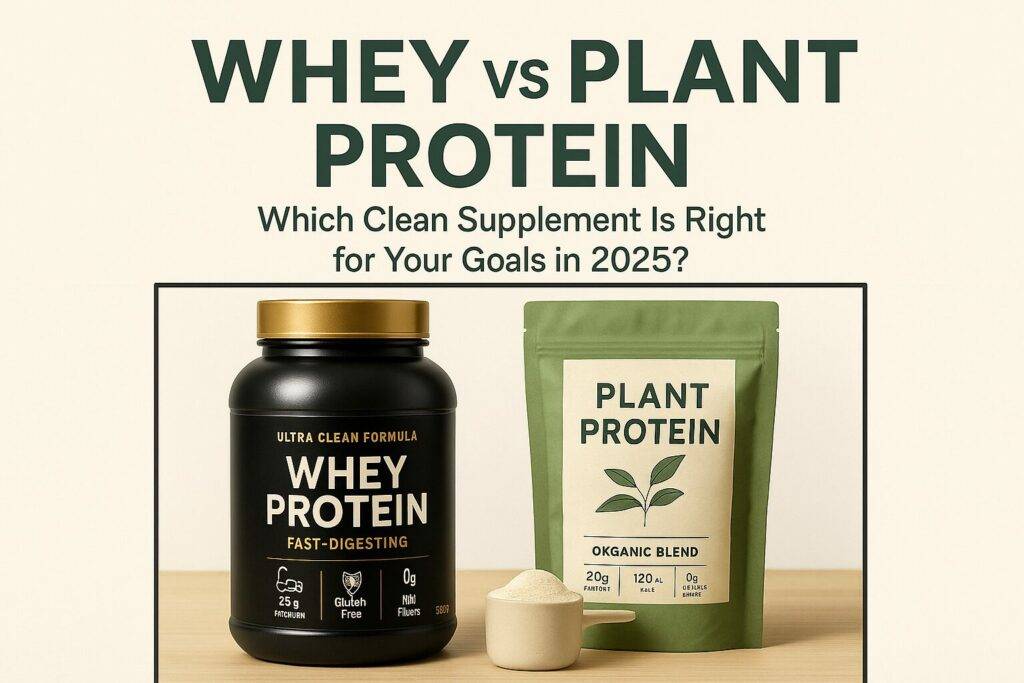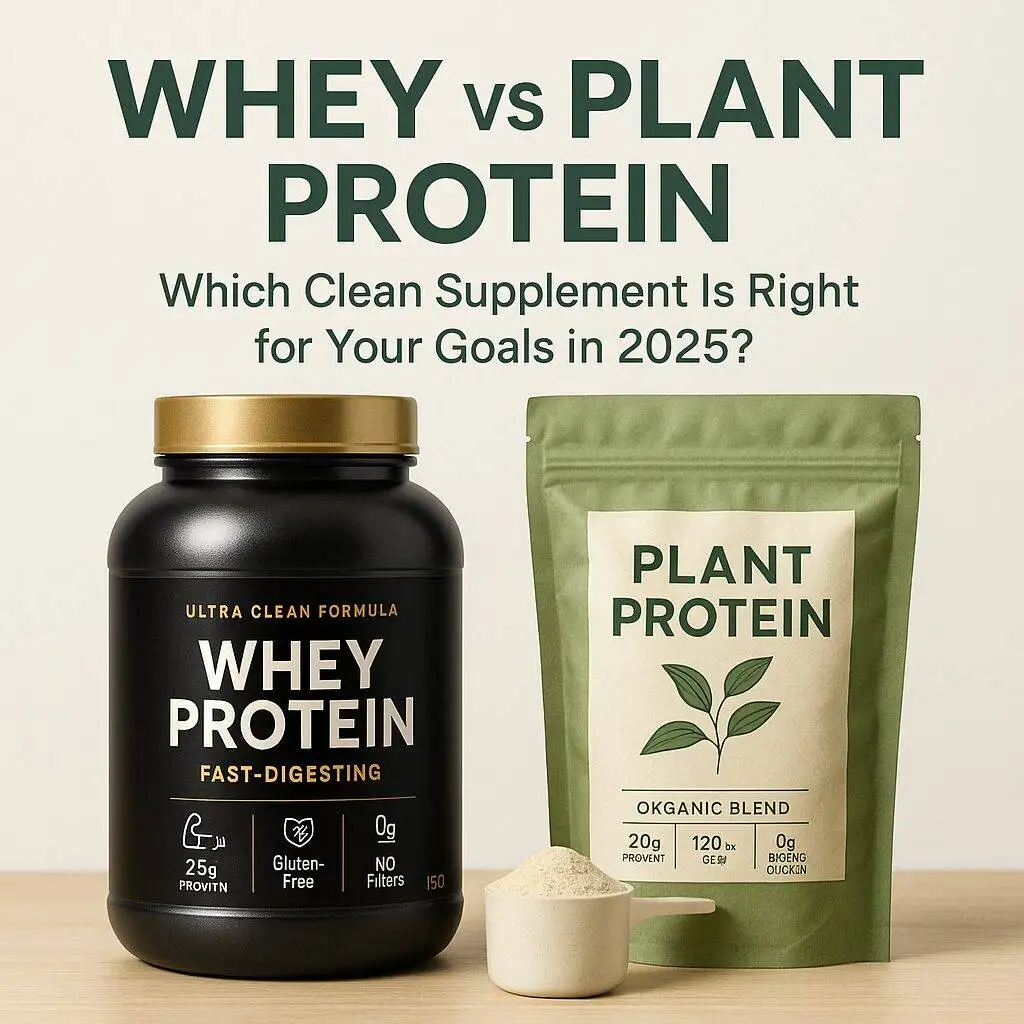Comparing whey vs plant protein can feel overwhelming—especially with so many clean-labeled options available in 2025. Whether you’re aiming to build muscle, lose weight, or enhance recovery, understanding the difference between these two protein sources is essential. In this article, we’ll help you identify the right protein powder for your fitness goals and lifestyle.

Table of Contents
Toggle1. Understanding the Basics of Whey and Plant Protein
Whey protein is derived from milk during the cheese-making process. It contains all nine essential amino acids, making it a complete protein. It’s particularly high in leucine, a key amino acid that triggers muscle growth. It’s popular among athletes because it digests quickly and is rapidly absorbed.
Plant-based protein powders, on the other hand, are made from sources such as peas, rice, hemp, and soy. Many formulas are blended to ensure a complete amino acid profile. While plant proteins often digest more slowly than whey, they offer added benefits like fiber, antioxidants, and easier digestion for sensitive individuals.
2. Whey vs Plant Protein for Your Fitness Goals
🏋️ Muscle Gain
If your primary goal is to build lean muscle mass, whey protein is your best bet. Thanks to its fast absorption and high leucine content, whey is highly effective post-workout. A serving within 30 minutes of exercise can maximize muscle protein synthesis.
🔥 Weight Loss
For those focused on fat loss, plant-based protein may offer an edge. These powders often contain fewer calories, more fiber, and slower digestion—helping you feel fuller for longer. Some blends also support gut health and blood sugar regulation.
👉 Explore Plant Protein Options
🛌 Recovery & Performance
Post-workout recovery requires a mix of fast and slow-digesting proteins. While whey helps with immediate repair, a plant-based blend may support long-term recovery through its anti-inflammatory compounds and micronutrients. Some clean protein blends even combine pea and brown rice for sustained amino acid delivery.
👉 Shop Recovery-Friendly Protein
3. Quick Comparison: Whey vs Plant Protein
| Feature | Whey Protein | Plant Protein |
|---|---|---|
| Source | Milk (Dairy) | Peas, rice, hemp, etc. |
| Amino Acid Profile | Complete | Usually complete (blended) |
| Digestion Speed | Fast | Slow to moderate |
| Calories | Higher | Lower (varies) |
| Digestive Comfort | May cause bloating in lactose-sensitive users | Generally easier to digest |
| Ideal For | Muscle gain, performance | Weight loss, vegan diets, recovery |
4. Clean Label Considerations
In 2025, clean eating matters more than ever. Consumers are demanding transparency and simple ingredients. Regardless of which protein type you choose, here’s what to look for in a clean protein powder:
- No artificial sweeteners (e.g., sucralose, aspartame)
- No fillers or gums
- Organic or non-GMO certification
- Transparent sourcing and testing
- Minimal ingredient list
All protein products featured on our site meet these clean label standards.
5. Who Should Choose Whey or Plant Protein?
Still unsure whether whey or plant-based protein is right for you? Here are real-world examples that can help:
- The Busy Gym-Goer: Needs something quick after training? Go with whey isolate—it’s fast-digesting and convenient to mix with water on the go.
- The Vegan Athlete: Following a plant-based lifestyle? Opt for blended plant protein that includes pea and brown rice for a complete amino acid profile.
- The Sensitive Stomach: If you’ve experienced bloating or digestive issues with dairy, try plant-based protein with added digestive enzymes or fiber.
- The Budget-Conscious Beginner: Many quality plant proteins are cost-effective and offer better value per serving than premium whey blends.
6. How to Use Whey vs Plant Protein in a Daily Routine
Sample Day with Whey Protein:
- Morning: Breakfast with oats and fruit
- Post-Workout: 1 scoop whey isolate in water
- Afternoon Snack: Greek yogurt + berries
Sample Day with Plant Protein:
- Morning: Green smoothie with banana, spinach, and plant protein
- Midday Snack: Protein bar (plant-based)
- Evening: Plant-based shake with almond milk + oats
7. Final Thoughts on Whey vs Plant Protein
When it comes to whey vs plant protein, the best option is the one that fits your goals, dietary needs, and digestion. Whey remains the top choice for rapid muscle gain, while plant protein is ideal for weight control, gentle digestion, and a more sustainable diet.
You don’t need to choose one forever—some people use both! For example, whey isolate post-workout and plant protein for morning smoothies or evening recovery shakes.
Start with a clean product, track your performance, and adjust as needed.
8. Frequently Asked Questions: Whey vs Plant Protein
8.1 Is whey or plant protein better for building muscle?
Whey protein is generally better for building muscle due to its higher leucine content and fast absorption. However, many plant-based blends now offer complete amino acid profiles and are also effective if taken consistently.
8.2 Can I use both whey and plant protein?
Yes, combining both is common. For example, use whey post-workout for quick recovery and plant protein in smoothies or meals for balanced nutrition throughout the day.
8.3 Is plant protein good for weight loss?
Yes. Plant protein tends to be lower in calories and higher in fiber, helping you feel full longer. It also supports stable blood sugar and digestion, which are essential for sustainable fat loss.
8.4 Is whey protein safe if I’m lactose intolerant?
Whey isolate contains very low lactose and is often well tolerated. However, if you’re highly sensitive or allergic, plant-based protein is a better choice.
8.5 Which protein is cleaner or more natural?
Both whey and plant proteins can be clean if they avoid additives, artificial sweeteners, and fillers. Look for non-GMO, organic, and third-party tested products with minimal ingredients.
🔗 Want More Protein Insights?
- Best Clean Protein Supplements for Recovery in 2025
- Top Protein Powders for Muscle Gain in 2025
- How to Choose the Best Clean Protein Supplement for Your Goals (2025 Guide)
📘 External Resource
Still curious? Read this in-depth guide on plant vs whey protein by Healthline.
Disclosure: As an Amazon Associate, HealthFitHub earns from qualifying purchases.

